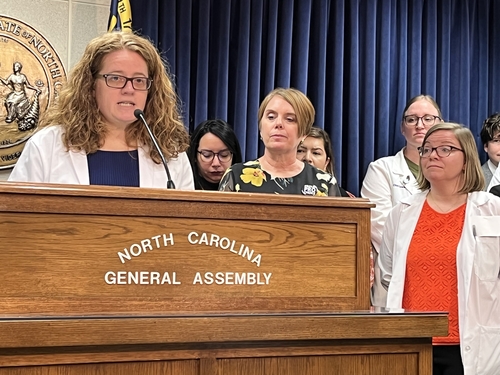North Carolina’s existing abortion restrictions harm patients, doctors say


As Republicans in the state legislature contemplate more abortion restrictions, doctors who treat pregnant patients highlighted the existing legal barriers that present obstacles to good medical care.
Among the state’s restrictions are a 20-week abortion ban, a 72-hour waiting period, a prohibition on telehealth appointments for abortion pill prescriptions, a requirement that patients take the first pill in the presence of a doctor, and a prohibition on medical professionals other than doctors prescribing abortion pills.
Sponsors call the bill lifting those restrictions and others “The RBG Act,” an homage to former US Supreme Court Justice Ruth Bader Ginsburg.
“The RBG Act removes all the big government regulations that have been restricting access to abortion care in our state and treats abortion like all other medical care,” said Sen. Natasha Marcus, a Mecklenburg County Democrat and a sponsor of Senate bill 353.
Doctors who spoke in favor of bills filed Wednesday said state laws put patients at risk.
Doctors who provide care to patients with high-risk pregnancies said they wrestle with questions about the care they’re allowed to offer under the state’s 20-week ban that even hospital lawyers cannot answer.
A federal judge reinstated the 20-week abortion ban last August, after the US Supreme Court overturned the constitutional right to abortion. Abortions after 20 weeks are permissible in North Carolina only in urgent medical emergencies.
There is a great deal of variability among patients when life-threatening complications arise, said Dr. Lisa Carroll, who specializes in high risk pregnancies. So when legislators ask for definitions of lethal fetal conditions and maternal emergencies “they are misunderstanding the complexity,” she said.
Dr. Nicole Teal is doing a fellowship in maternal-fetal medicine and treats patients with high-risk pregnancies. She turned down a job in North Carolina because of existing legal impediments to patient care, she said. Teal plans to return to California to practice.
Doctors say that when a patient’s amniotic sac breaks months before a due date, the fetus is not likely to survive. Those that do have serious disabilities.
Teal said she’s faced about 15 situations since last summer where patients who had a desired pregnancies learned of serious medical conditions in themselves or their fetuses after 20 weeks.
Patients have to be monitored, sometimes for weeks, for symptoms of declining health before doctors can perform abortions.
“Thinking about facing that for a whole career is just so outside my moral obligation to patients,” Teal said. “I felt I really couldn’t stay here.”
If serious problems with the fetus are discovered – vital organs haven’t developed, for example – patients cannot have abortions in North Carolina after 20 weeks.
“With a lethal fetal anomaly where we know survival is impossible after birth, if we diagnose that after 20 weeks, we would have to send them to another state if they wanted to have an abortion,” said Carroll. “Their choices at that time would be to go to another state to have an abortion or to continue the pregnancy, deliver the baby, then watch the baby die. And that’s a stark choice for a lot of people.”
Abortions have increased in North Carolina since Roe vs. Wade was overturned because several neighboring states have more restrictive laws, Policy Watch has reported.
People coming to North Carolina from other states are those who have the money to travel, can take time off from work, and are able to find care for their children, said Dr. Beverly Gray, an Ob-Gyn.
“Those patients are already dealing with so many barriers. I’ve cared for patients who got up here and didn’t have money for gas to get back home,” she said. “It is heartbreaking right now to see what patients are going through just to get here, and what worries me are the patients who are turned away” or don’t have the means to drive to another state to get medical care.
Even before Roe was overturned, it was hard for people in rural North Carolina to reach abortion providers, she said. Only nine of the state’s 100 counties have clinics.
“We have got to pass bills like this because even though abortion is still legal, it’s not accessible to many, many people because of all these unnecessary barriers that we’ve put in place,” said Rep. Julie von Haefen, a Wake County Democrat and a sponsor of House bill 439.
Von Haefen said she didn’t expect Republicans to make an about-face and agree to lifting existing restrictions. But it’s important for the public to know that there are legislators, doctors, and other advocates fighting for abortion rights, she said.
“I’m a realist on this issue, but it is extremely important for people to know that we know that these barriers are ridiculous. They’re hurting people,” she said.


